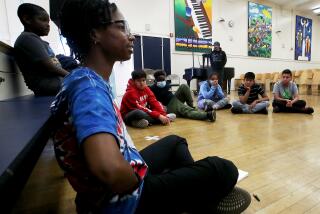Japan’s Kids Cringe as Schools End 6-Day Weeks
- Share via
TOKYO — Satoru Shiina is upset at Japan’s decision to end Saturday classes at public schools and put the kids on a five-day week.
“I could fall behind students who are in cram school or at other schools that go six days a week,” Shiina says. “I have to go to college and find a job, but I don’t know I will be able to.”
Shiina is 12 years old.
But even if boys as young as he are fretting, not to mention parents, a 100-year-old tradition is ending as Japan’s 2,110 primary and secondary public schools open for the new academic year over the next couple of weeks.
Monday-to-Friday schooling slashes 100 hours from the school year and cuts back the workload that students are given each year by as much as 30%. It does, however, require three hours a week of extracurricular pursuits such as debate, ping pong or judo.
The move is in line with a larger trend toward putting in fewer hours at work and allowing more time for hobbies or family. The government has in recent years added more public holidays. Many companies, hit by the slumping economy, have introduced five-day weeks and reduced overtime.
Japan’s education ministry believes the new curriculum at public schools, which teach 87.6% of all students, will better educate children by focusing on reasoning and independent thinking rather than memorization.
“In the past, all students have had to memorize the same . . . characters and mathematical equations. But that isn’t enough anymore,” said Hironobu Asami, who heads the ministry’s curriculum section.
Japanese kids become aware at an early age that if they don’t study hard and get into a good university, they can say goodbye to the Japanese dream of a nice job at a big-name company.
Japan’s schools have earned international praise for achieving near 100% literacy. Children here consistently score higher on achievement tests than Americans.
But instead of successful test-takers, Japan needs innovators and virtuosos, said Shumon Miura, a former chairman of the national curriculum committee that advises the government.
“This new elite will be people who will choose their own calling--not like in the past when the so-called elite were chosen based on the schools they attended,” he said.
But Japan still has a strong workaholic bent. Some parents and teachers argue that children and teenagers already study less. Working parents complain they will have to choose between taking time off from their jobs or finding a baby-sitter.
“As a teacher, I will get to spend more time with my own kids,” said Akemi Ueno, a sixth-grade teacher. “But as a parent, I realize that this will give public-school children more free time and less homework and make it harder for them to compete with private-school children.”
Some experts agree.
Takehiko Kariya, a professor at Tokyo University, says statistics suggest that reforms in the early 1990s cutting some weekend classes and loosening curriculum requirements haven’t helped youngsters.
In one of his recent studies, less than half of Tokyo fifth-graders tested could solve basic arithmetic problems--compared with 89% at the same schools 20 years ago.
Kariya said that instead of freeing up kids’ minds, national policy is widening the gap between the intellectual haves and have-nots. “It’s irresponsible to force a policy that nobody is certain will work--and that legally requires all [public] schools to comply--on such a huge system as this,” he said.
Many private schools, meanwhile, are looking to capitalize on parents’ anger. They plan to stay on the Monday-Saturday schedule.
More to Read
Sign up for Essential California
The most important California stories and recommendations in your inbox every morning.
You may occasionally receive promotional content from the Los Angeles Times.













